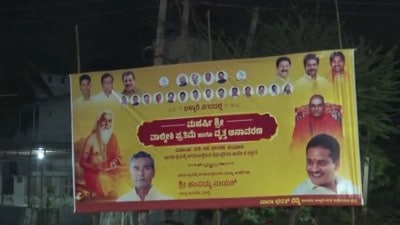Word146;s worth
On the cards 8226; Paanch Kaurav, a period thriller 8226; Dilli-6, a drama set in Chandni Chowk 8226; Bhairavi, a musical, which he hope...

Even as he awaits the release of his next, Rang De Basanti8212;with Aamir Khan in the lead role8212;Aks is on Mehra8217;s mind. 8216;8216;Aks is a growing child, with its own instinct and flaws. I can8217;t explain my fondness for it. Its darkness is within me, growing,8217;8217; Mehra maintains.
It8217;s the last leg of post-production for Rang De Basanti. Minor changes are being executed in a no-frills editing studio in suburban Mumbai. A restless energy is palpable in the editing console as Mehra monitors the changes in a 10-second scene many times over. Later in the night, over coffee and cigarettes, he spills a few beans in measured words8212;8216;8216;It8217;s a film about youth, about the enthusiasm of youth. I8217;ve drawn from my own experiences in college and from friends, yet it8217;s very contemporary. The buzz about it says nothing, really.8217;8217; In the same breath, he adds, 8216;8216;Anyway, I hate buzz.8217;8217; Especially when the 8216;buzz8217; is controversial. Just weeks before its release, Mehra8217;s venture ruffled feathers at the Indian Air Force and Defence Ministry for its treatment of the MiG crash incidents.
Mehra is known in the industry for his lack of hard sell and subterfuge. Before Aks, he chose his words with the media and after its short run, he almost vanished from the scene, until Aamir Khan announced Rang.
8216;8216;I8217;d been writing for five years,8217;8217; says Mehra, 8216;8216;when I left advertising, I couldn8217;t write even two pages that sounded right and it showed in Aks. The screenplay was its Achilles8217; heel.8217;8217;
|
|
Mehra8217;s journey8212;from Delhi8217;s Chandni Chowk to Mumbai8217;s ad and film world8212;is itself good fodder for a screenplay. One of three siblings, neither of his parents were educated beyond high school. After school, he went to Delhi8217;s Shri Ram College of Commerce on a sports scholarship for his swimming abilities. 8216;8216;Our fees were more than what my father earned,8217;8217; he recalls. Starting as a door-to-door salesman with Eureka Forbes, he landed a job in Systems, a small advertising agency where he was a 8216;8216;glorified peon8217;8217; and later in Ulka, in its client servicing department.
Once, while shooting for a Hero Honda film for Ulka, adman Prahlad Kakar broke his hand and Mehra had to execute the last touches to the ad. Seeing the finished product, Kakar told him, 8216;8216;You belong in Bombay.8217;8217;
Mehra moved to Mumbai in the late 8217;80s, and after directing Bachchan8217;s first ever commercial for BPL and his music videos Eir Bir Phate and Kabhie Kabhie, the road to feature films opened. It fostered a close association between Mehra and the Bachchans Mehra was supposed to launch Abhishek Bachchan instead of JP Datta8217;s Refugee. Now, Mehra is averse to advertising. 8216;8216;Ads can8217;t teach you anything about cinema. I learnt a few tricks, that8217;s all,8217;8217; he says.
In the last five years, he8217;s been possessed by words, plot and structure and is ready with two scripts. One is a caper adventure8212;8216;8216;possibly with Amitabh and Abhishek Bachchan.8217;8217; His wife, a former film editor, who works with him in his production house Flicks Motion Pictures Co, insisted he make Rang8230; first. He8217;s also planning an animation film, a genre he warmed to after watching his two children8217;s collection.
Mehta went to Aamir with a bound script, and after two-and-a-half hours of narration, the star agreed. The name tags for both the films, he says, have worked wonders. 8216;8216;It is after all, a star-driven industry. I have no big illusions about creativity, it8217;s nothing exclusive. Anybody can be creative, it doesn8217;t bring you fame. As long as a star is there because the role suits them, I8217;m happy,8217;8217; he admits.
People Mehra has worked closely with believe this nonchalance is deceptive. Actor Kunal Kapoor8212;who assisted him in Aks and is part of the Rang8230; cast8212;says Mehra was a different man on the sets of Aks. 8216;8216;He8217;s almost like a Sufi saint now, totally in control,8217;8217; says Kapoor. 8216;8216;But with Rakyesh, there8217;s a dark side. His deadpan humour and calm masquerade it most of the time.8217;8217;
- 01
- 02
- 03
- 04
- 05































